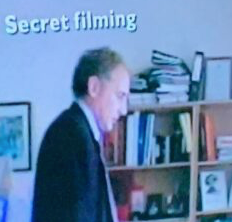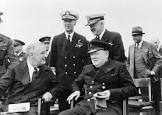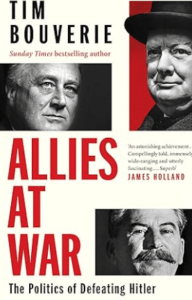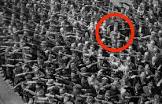- Missing in action - 12th February 2026
- Travel news again - 11th February 2026
- Ewe turn - 10th February 2026

During 42 years in journalism (when he was trained to use simple language, avoiding jargon) seeing major events differently from the way they were perceived, has always been crucial for our Editor, Welshman Phil Parry (who spent 23 years with the BBC), and now this is emphasised by a new book which reveals fresh historical evidence concerning a key episode in the Second World War.
It has always seemed important to me NOT TO FOLLOW THE CROWD!
This means that when all the headlines point in one direction, I go the other.
 For example, in my time (often using secret filming) I have uncovered innumerable facts about jailed ‘murderers’ which disclose that the men (and it always was a man) were innocent, as well as how a defrocked vicar had been wronged.
For example, in my time (often using secret filming) I have uncovered innumerable facts about jailed ‘murderers’ which disclose that the men (and it always was a man) were innocent, as well as how a defrocked vicar had been wronged.
All of these cases (and they are just the tip of the iceberg), attracted news headlines about the guilt of the person, but I would invariably go the other way because I felt in my bones there was more to it, and this was confirmed once I had looked into them.

They also attracted obnoxious abuse, as, it appeared, some individuals thought you should not question somebody’s guilt.
I have never really understood this.
Now all of this is highlighted (oddly!) by a new book about a seminal event of the Second World War – the sinking of the French navy.
It has long been thought of as a ruthless, but perhaps necessary act by Winston Churchill to stop ships falling into the hands of the Nazis, because they were of course part of the collaborationist Vichy regime.
But new evidence suggests it may also have played a part in convincing America it should help Britain, because it persuaded Franklin Roosevelt that Britain was determined to fight on – if necessary alone (with the might of the empire behind it).

The destruction of the French fleet at Mers el-Kébir, Algeria, by the Royal Navy in July 1940 was both Britain’s first victory of the second world war and its most distasteful.
Almost 1,300 French sailors died in the attack.
As a new history of the war now shows, the Prime Minister (PM) was right to calculate that such stern action would convince the world—and especially still-neutral America—that Britain was determined to fight on despite the fall of France.


Roosevelt would later tell an adviser, Harry Hopkins, that Churchill’s actions made him certain that Britain would continue the war, “if necessary for years”, and “if necessary alone”.
It was a vital corrective to the defeatist dispatches of Joseph Kennedy, the American ambassador in London.

Two months later, in September 1940, America agreed to send 50 destroyers to Britain in exchange for leases to British-owned army bases.
Then, in March 1941, at the president’s urging, Congress approved $7 billion-worth of Lend-Lease aid for Britain (the equivalent of around $160 billion in today’s money), and the policy “would make an inestimable contribution to Allied victory”.

So this may not simply have been a ruthless but necessary act, it could also have been important in securing for Britain the tools from America to fight on – and Churchill might have known this.
It’s important not to follow the crowd!
The memories of Phil’s, remarkable decades long award-winning career in journalism (during which he often went against the grain) as he was gripped by the rare and incurable neurological disabling condition Hereditary Spastic Paraplegia (HSP), have been released in another major book ‘A GOOD STORY’. Order it now! ‘Allies at War’, by Tim Bouverie, is published by Crown, and Bodley Head.

Tomorrow – how an imminent UK Government White Paper which is expected to address the appalling fact that the police solve hardly any crimes, will for critics emphasise the scandal over Wales’ biggest force being responsible for a string of miscarriages of justice when innocent people were sent to jail.









